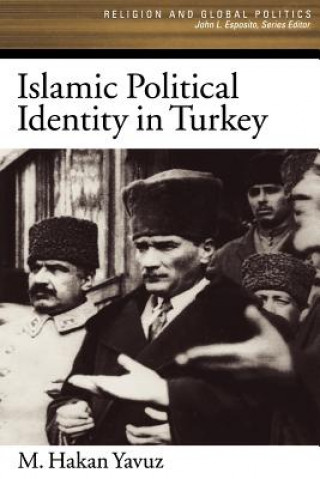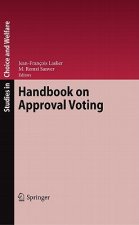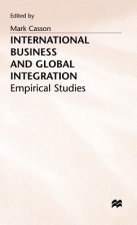
Kód: 04516798
Islamic Political Identity in Turkey
Autor M. Hakan Yavuz
In November of 2002, the Justice and Development Party swept to victory in the Turkish parliamentary elections. Because of the party's Islamic roots, its electoral triumph has sparked a host of questions both in Turkey and in the ... celý popis
- Jazyk:
 Angličtina
Angličtina - Väzba: Brožovaná
- Počet strán: 336
Nakladateľ: Oxford University Press Inc, 2005
- Viac informácií o knihe

Mohlo by sa vám tiež páčiť
-

Blood, Sweat and Tyres
13.80 € -5 % -

Murphy's Revenge
11.35 € -

Handbook on Approval Voting
252.02 € -

World of Agatha Christie
7.77 € -13 % -

International Business and Global Integration
139.46 € -

European Identity
196.35 € -

Change
24.85 €
Darčekový poukaz: Radosť zaručená
- Darujte poukaz v ľubovoľnej hodnote, a my sa postaráme o zvyšok.
- Poukaz sa vzťahuje na všetky produkty v našej ponuke.
- Elektronický poukaz si vytlačíte z e-mailu a môžete ho ihneď darovať.
- Platnosť poukazu je 12 mesiacov od dátumu vystavenia.
Viac informácií o knihe Islamic Political Identity in Turkey
Nákupom získate 201 bodov
 Anotácia knihy
Anotácia knihy
In November of 2002, the Justice and Development Party swept to victory in the Turkish parliamentary elections. Because of the party's Islamic roots, its electoral triumph has sparked a host of questions both in Turkey and in the West: Does the party harbor a secret Islamist agenda? Will the new government seek to overturn nearly a century of secularization stemming from Kemal Ataturk's early-twentieth-century reforms? Most fundamentally, is Islam compatible with democracy? In this penetrating work, M. Hakan Yavuz seeks to answer these questions, and to provide a comprehensive analysis of Islamic political identity in Turkey. He begins in the early twentieth century, when Kemal Ataturk led Turkey through a process of rapid secularization and crushed Islamic opposition to his authoritarian rule. Yavuz argues that since Ataturk's death in 1938, however, Turkey has been gradually moving away from his militant secularism and experiencing "a quiet Muslim reformation." Islamic political identity is not homogeneous, says Yavuz, but can be modern and progressive as well as conservative and potentially authoritarian. While the West has traditionally seen Kemalism as an engine for reform against "reactionary" political Islam, in fact the Kemalist establishment has traditionally used the "Islamic threat" as an excuse to avoid democratization and thus hold on to power. Yavuz offers an account of the "soft coup" of 1997, in which the Kemalist military-bureaucratic establishment overthrew the democratically elected coalition government, which was led by the pro-Islamic Refah party. He argues that the soft coup plunged Turkey into a renewed legitimacy crisis which can only be resolved by the liberalization of the political system. The book ends with a discussion of the most recent election and its implications for Turkey and the Muslim world. Yavuz argues that Islamic social movements can be important agents for promoting a democratic and pluralistic society, and that the Turkish example holds long term promise for the rest of the Muslim world. Based on extensive fieldwork and interviews, this work offers a sophisticated new understanding of the role of political Islam in one of the world's most strategically important countries.
 Parametre knihy
Parametre knihy
Zaradenie knihy Knihy po anglicky Society & social sciences Society & culture: general Social groups
81.34 €
- Celý názov: Islamic Political Identity in Turkey
- Autor: M. Hakan Yavuz
- Jazyk:
 Angličtina
Angličtina - Väzba: Brožovaná
- Počet strán: 336
- EAN: 9780195188233
- ISBN: 0195188233
- ID: 04516798
- Nakladateľ: Oxford University Press Inc
- Hmotnosť: 485 g
- Rozmery: 235 × 152 × 20 mm
- Dátum vydania: 24. November 2005
Obľúbené z iného súdka
-

Women Who Run with the Wolves
11.65 € -3 % -

The Mastery of Love
12.37 € -19 % -

Intellectuals and Society
22.40 € -21 % -

Muhammad: His Life Based on the Earliest Sources
20.86 € -23 % -

Wisdom of the Native Americans
20.05 € -1 % -

Gender Trouble
27.21 € -4 % -

Rule by Secrecy
12.27 € -23 % -

Whipping Girl
17.18 € -19 % -

Islam, Arabs, and the Intelligent World of the Jinn
36.11 € -

Death of Nature
18.31 € -6 % -

City of Dreadful Delight
47.16 € -

Islamic Arms and Armor - In The Metropolitan Museum of Art
101.09 € -

Servitors of Empire
20.35 € -4 % -

History of Sexuality: an Introduction
17.59 € -3 % -

Art of Manliness - Manvotionals
14.62 € -20 % -

Indaba, My Children
22.40 € -3 % -

Gerotranscendence
145.70 € -

Indian Sign Language
10.84 € -4 % -

Gender Knot
35.50 € -9 % -

Think Like a Monk
15.75 € -24 % -

Who Cooked the Last Supper?
19.84 € -7 % -

Second Sex
16.57 € -23 % -

Goddesses in Everywoman
12.27 € -23 % -

Women Who Run With The Wolves
17.59 € -9 % -

Tom of Finland. The Complete Kake Comics
21.17 € -

Orientalism
11.04 € -23 % -

The Male Nude
18.31 € -10 % -

The Autobiography of Malcolm X
10.53 € -8 % -

Humans of New York
25.78 € -17 % -

Culture of Critique
23.93 € -17 % -

Dance of Anger
11.14 € -23 % -

Empire of the Summer Moon
14.42 € -23 % -

Desert Flower
10.22 € -24 % -

World's Best Cities
38.87 € -5 % -

Complete Book of Pilates for Men
19.33 € -20 % -

Allegory and Philosophy in Avicenna (Ibn Sina)
80.93 € -

Manipulated Man
14.01 € -18 % -

Going Clear
15.65 € -18 % -

The Way of Men
14.01 € -19 % -

Qur'an
32.84 € -23 % -

We Should All Be Feminists
7.56 € -25 % -

Talking with Female Serial Killers - A chilling study of the most evil women in the world
11.14 € -23 % -

Nice Girls Don't Get The Corner Office
9.81 € -24 % -

The Bell Curve
18.72 € -23 % -

Beauty Sick
12.27 € -23 % -

Iron John
16.57 € -22 % -

Black Rednecks & White Liberals
21.89 € -16 % -

Witches, Midwives, And Nurses
13.29 € -

Generations
19.94 € -14 %
Osobný odber Bratislava a 2642 dalších
Copyright ©2008-24 najlacnejsie-knihy.sk Všetky práva vyhradenéSúkromieCookies



 21 miliónov titulov
21 miliónov titulov Vrátenie do mesiaca
Vrátenie do mesiaca 02/210 210 99 (8-15.30h)
02/210 210 99 (8-15.30h)